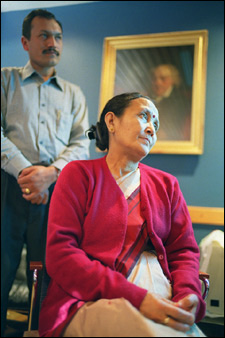Organization fights against trafficking in Nepali girls:
Group founder brings story to Kennedy School

In 1994, Nepal reported that 1,600 girls had been lured into the sex trade, largely in brothels in nearby India. Maiti Nepal, an organization founded to fight the trafficking of young Nepali girls, estimates the actual figure was 100 times higher.
After years of advocacy on behalf of girls who are lured, deceived, and outright kidnapped into brothels, Maiti Nepal has convinced Nepal’s government that the problem is much more severe than it had thought.
But there’s still much work to do, according to Maiti Nepal’s founder, Anuradha Koirala. Koirala brought the story of her struggle to the Kennedy School of Government last Friday (March 7) at a talk sponsored by the Women and Public Policy Program. Program director Swanee Hunt said that trafficking in girls for the sex trade is a growing problem worldwide and one that demands greater attention.
Hunt cited recent FBI estimates that indicated 50,000 people are trafficked into the United States, and 500,000 trafficked worldwide, each year.
“This phenomenon is expanding. It is one of the great tragedies of our contemporary time. There’s not a country on Earth not affected by this scourge,” Hunt said.
Koirala began Maiti Nepal in 1993. Since then, the organization has attacked the problem from several directions, offering education and intervention to stop the trafficking and rehabilitation to help girls who’ve escaped or been discarded by the brothels. Five months ago, Koirala was appointed Nepal’s minister for women, children, and social welfare. She said she expects to leave the post after five more months, when the next elections are held.
Speaking before about 40 people gathered in the Kennedy School’s Fainsod Room, Koirala painted a grim picture of the problem. The trade is fueled by ignorance and illiteracy and driven by poverty, gender discrimination, and greed, Koirala said. Parents sometimes willingly turn their daughters over to traffickers who promise city jobs that will allow the girls to send money home and return better off in a few years. Sham marriages are also arranged, with the girls going off to a new life with “husbands” who turn them over to pimps.
There are three major destinations for the girls, Koirala said. Inside Nepal, girls are hired to work at hotels and restaurants and forced into the sex trade once there. The Middle East is the largest overseas destination, Koirala said, where girls supposedly hired as housemaids are forced to have sex with male members of the household.
But the biggest problem is the sex trade with India, Nepal’s giant neighbor to the south. Maiti Nepal estimates that there are between 150,000 and 300,000 Nepali girls in Indian brothels. In 2001, just 69 were rescued.
Girls averaging 16 years old, but some as young as 7, are forced to service between five and 25 clients per day, Koirala said. Unwilling girls are beaten, burned with cigarettes, shocked with electric cords, and even burned with acid. Many have had multiple unwanted pregnancies, followed by multiple backroom abortions.
AIDS is an enormous problem, Koirala said, as the girls and their clients are often infected and can spread the disease. If they are injured too badly or become unable to perform, they are kicked out, to make their way home alone, Koirala said.
“They use them and just throw them back when they’re useless,” Koirala said. “They use their whole childhood. They use them up and throw them away.”
Maiti Nepal’s main preventive tool is education. They run workshops for police, lawmakers, and schoolteachers. They’re also active in Nepali villages, distributing pamphlets, doing street dramas, and singing songs to teach people about the dangers of trafficking. In addition, Maiti Nepal has prevention homes in three districts where high-risk girls can go.
During their six-month stay at the prevention homes, the girls undergo job training to teach them skills to help them earn a living in their villages. The girls are then given microcredit loans to help them get started.
At Nepal’s borders with India, the group has established nine transit homes. These homes are staffed with women who have escaped from Indian brothels, Koirala said. They watch people crossing the border for likely traffickers in hopes of intercepting them before they enter India.
“This is the best surveillance group because they know who is a trafficker,” Koirala said.
The transit homes also serve as a safe haven for girls who’ve escaped from a brothel and are making their way home to Nepal. These girls, she said, had been preyed upon by Nepali border guards, who took advantage of them just when they thought they were home and safe.
The group also runs a hospice, where girls infected with AIDS, hepatitis, or other sexually transmitted diseases can live because they’re often not accepted back to their villages. The facility, called Sneha Griha, or Home of Affection, includes fields so residents can grow vegetables and live in an environment similar to the one in Nepali villages.
After hearing Koirala’s presentation, Hunt said it’s impossible not to be affected by it. In fact, she said, the challenge is not to be paralyzed by its sadness. It is important the issue be aired not only globally, Hunt said, but also here at Harvard.
“It’s very important that students here at Harvard get a dose of this kind of reality between their courses on statistics and game theory,” Hunt said.




